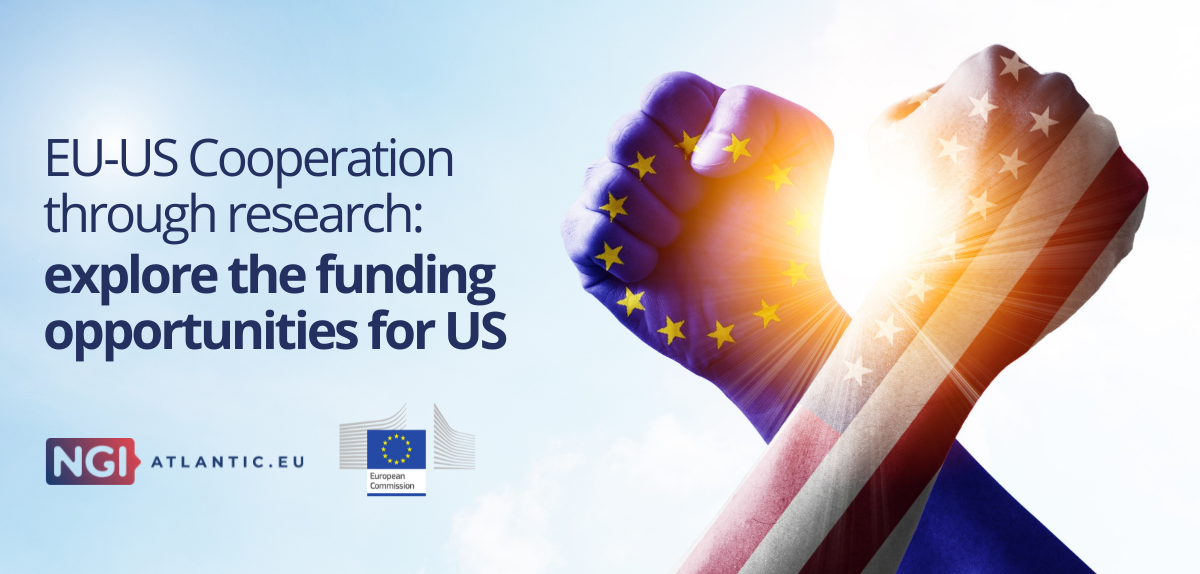EU-US Cooperation through research: explore the funding opportunities for US
EU-US Cooperation through research: explore the funding opportunities for US
NGIatlantic.eu is an NGI Research and Innovation Action provides funding for experimentation of research results on interconnected test-beds across the EU and the US.
The EU and US share research values such as openness, transparency, FAIRness, inclusiveness, academic freedom and ethics, and are natural partners in science, technology and innovation. Moreover, they have similar priorities, such as the green and digital transformation and, more recently, how to emerge from the Covid-19 pandemic.
At the June 2021 EU-US Summit, during the COVID-19 pandemic, leaders voiced their commitment to continue to engage in health research initiatives, with medical countermeasures to face the pandemic in a much shorter time frame at the top of the agenda. Other research priorities are a climate neutral future and just transition, i.e. by promoting clean energy technologies through Mission Innovation and working towards a Transatlantic Green Tech Alliance for the development and deployment of green technologies. Ever important is the joint goal to protect our oceans and ensure a sustainable blue economy, also through initiatives such as the All Atlantic Ocean Research Alliance to support collaborative research and exchanges.
As an H2020 initiative, NGIatlantic.eu grants funds to the EU partners of the selected projects, however, many other possibilities for funding are available for the US counterparts!
Here is a summary of the opportunities for US funding provided as indicated by the European Commission (we recommend reading the full article for a comprehensive view of the cooperation opportunities available):
- European Research Council: the ERC supports top researchers from anywhere in the world and in all research domains. US researchers can apply and, if selected, they can establish a research group in EU. Another option offered by the ERC is the possibility of a synergy grant, where the US researchers may collaborate with at least 2 EU researchers and receive funding.
- Implementing Arrangement: this is an agreement between EU and the US National Science Foundation (NSF), whereby NSF funds researchers with an active NSF awarded (i.e., already funded by NSF to do research) to spend some time in an ERC funded group in Europe (see point 1). The research period in Europe could be short/long term, from 2 to 12 months, or even split in multiple short-term visits, according to the experimental needs.
- Marie Skłodowska-Curie Actions: this program offers fellowships for post-doctoral researchers from US and other countries up to 2 years in a European group (or vice versa in US for EU researchers).
In the scope of NGIatlantic.eu, there are specific possibilities made available by US funding entities:
- NSF DCL Funding: The United States’ National Science Foundation (NSF), has a Dear Colleague Letter (DCL) Supplement fund for existing US NSF active grant holders (within NSF's Computer and Network Systems Core and Secure and Trustworthy Cyberspace programs) involved in applications submitted to the NGIatlantic.eu Project (NSF US-EU DCL 21-048). The award is subject to the NSF’s merit review process, as described in the NSF Proposal and Award Policies and Procedures Guide (PAPPG).
- The maximum funding available for the NSF grantee is of up to $100,000 or 20% of original grant budget (whichever is lower) for max duration of one year (the duration must fall within the period of their existing NSF grant period); For questions on the eligibility of projects, US partner(s) intending to apply to the NGIatlantic.eu 5th Open Call are invited to send a direct mail to the contact points in the NSF, available here.
- PAWR fund: for US partners that have an NSF grant that does not qualify for the NSF’s Computer and Network Systems Core and Secure and Trustworthy Cyberspace programs for the above DCL, there is another NSF supplemental fund available for US partners in NGIatlantic.eu applications who have existing active grants, including the NSF Platforms for Advanced Wireless Research (PAWR) supplemental fund: The PAWR fund is available to US-based academics, with existing NSF grants to receive connection and support to the 3 PAWR platforms, COSMOS, POWDER-RENEW, and AERPAW. While not specifically designated for international connections, there could be some scope to utilise this fund to team with an EU partner: Active NSF-funded wireless researchers may propose, as part of their supplemental funding request, experiments that utilize the PAWR platforms as these become “generally available” for experimenter use. NSF-funded wireless researchers may propose, as part of their supplemental funding requests, experiments that utilize the PAWR platforms as these platforms become 'generally available' for experimenter use (as indicated on the PAWR program website https://advancedwireless.org/ for each PAWR platform). Supplemental funding requests are anticipated from principal investigators (PIs) of active awards within NSF's Communications and Information Foundations, Computer and Network Systems Core, Cyber-Physical Systems, Secure and Trustworthy Cyberspace, Smart and Connected Communities, and Spectrum Efficiency, Energy Efficiency, and Security (SpecEES) programs, but according to the web site, PIs of projects funded by any NSF program are eligible. We recommend the US counterparts of the applying teams, to make contact with the responsible program contact. The points highlighted in the previous paragraph are also mentioned in our webinar Title “Q&A WEBINAR - Ask all your questions about the NGIatlantic.eu 4th Open Call”, the recording is available here.
Don’t miss the possibility to apply to our 5th Open Call! The dates will be published on our website: we will notify the community via newsletter and on our Twitter, LinkedIn and YouTube channels.

